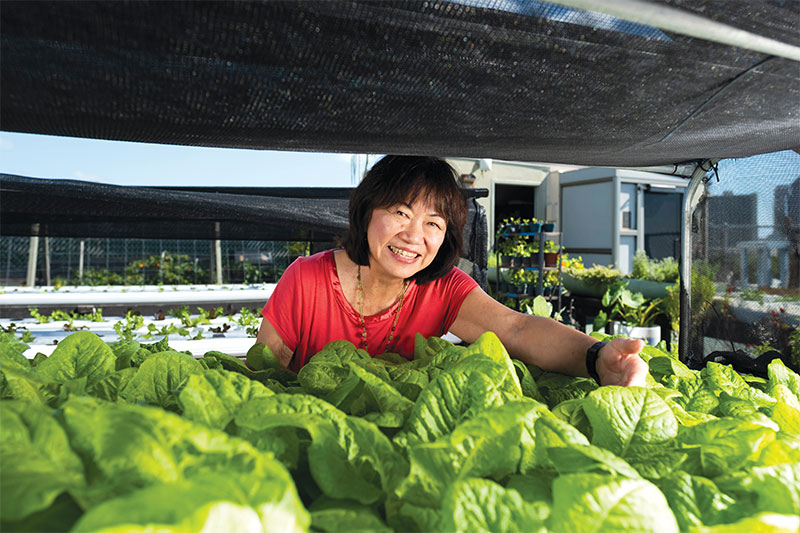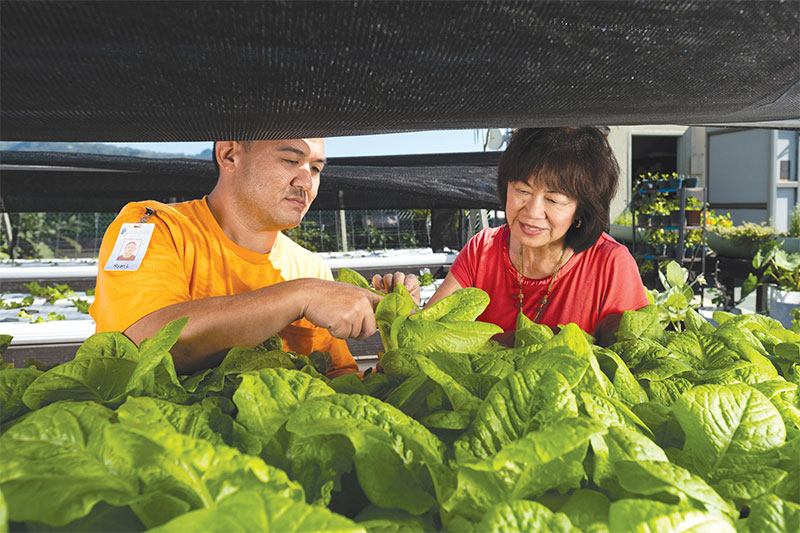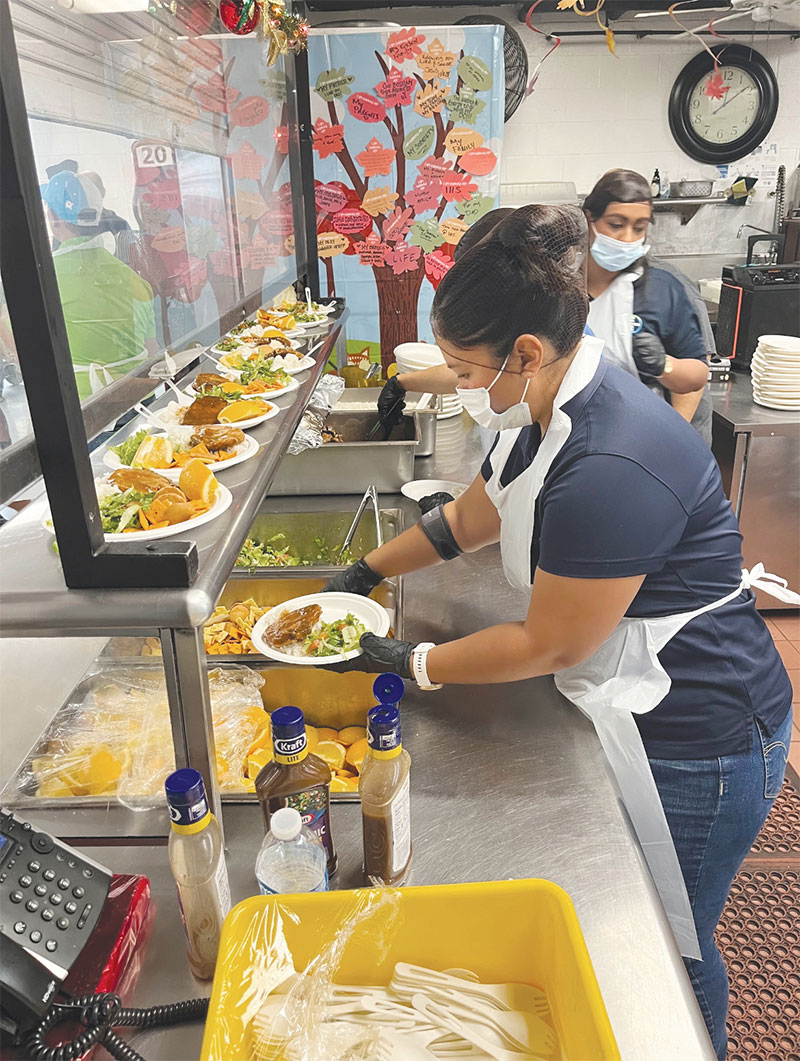New Beginnings

PHOTO BY ANTHONY CONSILLIO
The Institute for Human Services and its executive director Connie Mitchell have been a source of strength for the homeless in helping them find a fresh path forward.
The unfortunate truth is that homelessness can happen to anyone. Whether it be due in part to high housing costs, substance abuse, job loss or medical debt, a person may be just one life-altering event away from being at risk.

Urban agricultural assistant Ryan Lau and IHS executive director Connie Mitchell tend to a batch of lettuce from the IHS rooftop garden. PHOTO COURTESY THE INSTITUTE FOR HUMAN SERVICES
The Institute for Human Services, which officially became a nonprofit in 1982, understands that each situation is unique and aims to create tailored solutions for those in need. In addition to providing food and shelter, the organization offers supportive services to help individuals heal and succeed.
Over the past 10 years, IHS has assisted nearly 20,000 homeless individuals obtain subsidized and unsubsidized housing. It’s also served more than 2 million meals in that period.

Produce from the garden is utilized in the organization’s meal program. PHOTO COURTESY THE INSTITUTE FOR HUMAN SERVICES
“The number of homeless families on O‘ahu has been going down,” shares IHS executive director Connie Mitchell, who has been with the agency for nearly 20 years. “I think that when we as a community — and particularly our homeless services provider community — can focus on one sub-population, we’re really able to help decrease the homeless among them.”
The organization’s positive impact actually dates back to the late ’70s with Father Claude DuTeil’s peanut butter ministry. The volunteer-driven movement aimed to help those living on O‘ahu’s streets by providing them with peanut butter sandwiches and coffee.
Being that DuTeil struggled with both alcoholism and depression, he saw the need for more integrated clinical intervention. Between him and his wife, Roberta, their compassion for others sparked a change within the community, and is the reason IHS has grown into what it is today.
“They just really were a dynamic duo, from what I understand,” Mitchell says, adding that they would transport people to the hospital and even invite them into their own home. “It really was a lifestyle of caring for people that just went beyond a job. I think that we (at IHS) try to emulate that as much as possible.”
Throughout O‘ahu, more than 500 individuals reside at the agency’s various permanent housing communities. Being that each situation is unique, the housing process is different for everyone, but IHS hopes that within a couple months, it can move people from its shelter and find them permanent housing.
In addition to providing onsite medical services to shelter guests, IHS operates five medical respite homes called Tūtū Bert’s House. Named in honor of Roberta DuTeil, these homes cater to those being released from hospitals who need medical monitoring but no longer require hospital-level care.
While individuals are welcome to visit IHS shelters, the nonprofit also takes its services directly to those in need through its street medicine program, which helps treat ailments and encourages individuals to come to the center for help.
“Our specialty is triage, trying to figure out what, in fact, is the most impactful issue that is going on with that person — or issues, as a lot of times it’s more than one thing — and to be able to come up with a solution that really address that in the most effective way,” Mitchell explains.
Prior to joining IHS, Mitchell worked as a psychiatric nurse for the state Department of Health. Since some homeless individuals may also be dealing with mental health issues, Mitchell believes her prior experience has proven to be very useful at IHS.
“I didn’t realize maybe how much my background in mental health would be helpful, but it also is something that really drives me in this area,” says the University of Hawai‘i at Mānoa alumna. “I think it gives me a different perspective because I know what treatment can do for people and I really would like more people to get treated.”
She adds that many homeless people are immigrants, too, and since she has immigrant parents, she believes she can empathize with these individuals in a unique way.
“I think knowing what my parents went through, and the struggles we had, it helps me to be, on the one hand, pretty compassionate to people that may be experiencing the same thing,” she shares. “On the other hand, I think it also fuels me with a desire to challenge folks to be empowered and to really take advantage of opportunities that are set before you.”
As Hawai‘i is one of the nation’s most expensive places to live, finding work is the key to financial stability. As such, in addition to helping clients settle into permanent housing, IHS also offers employment services. Its Hele2Work program helps individuals get workforce ready by assisting with résumé writing, developing interview skills and more. Within the past 11 years, the organization has trained more than 8,000 individuals and helps secure jobs for about 25 people each month.
“We really want to help people find their strengths, their skills — learn new skills sometimes in order for them to get a job or get a better job so that they can earn more and be able to pay for their housing,” Mitchell says.
For those who haven’t worked in a long time, IHS offers prevocational training, where people can obtain hands-on experience through its Taking Root or New Leaf offerings. The former is an urban agriculture program in which IHS clients learn aquaponic and hydroponic farming, while the latter teaches various skills in the janitorial, landscaping and building maintenance industries.
Located at its women’s shelter, the Taking Root program features a scenic rooftop garden. Tending to the garden not only serves as an independent therapeutic task. It’s also where ingredients are harvested for the organization’s meal program — and even sold at local grocery stores.
IHS exists to not only assist individuals, but to help the entire ‘ohana thrive. Its family program focuses on the specific needs of both the parents and the keiki, such as providing parents with health education and financial literacy, and helping the children obtain school supplies and clothing. According to Mitchell, children that experience homelessness are four times as likely to become homeless themselves.
“We don’t want the children to grow up thinking that what they experienced is all that there is, like not having enough money and moving from place to place as a homeless individual in a homeless family,” Mitchell adds.
As executive director, Mitchell has seen her fair share of success stories and says that seeing people exit homelessness brings her so much joy.
“It feels like I’m really investing in the future of our community,” Mitchell says. “The folks that are experiencing homelessness now, if they get back into the workforce or if they are able to do other things that kind of reach out to help somebody else and they pay it forward, we’re going have a lot more goodness in our community.”
To learn more, or to volunteer, visit ihshawaii.org.

